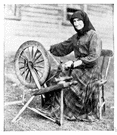Acadian
Also found in: Thesaurus, Encyclopedia, Wikipedia.
A·ca·di·an
(ə-kā′dē-ən)adj.
Of or relating to Acadia or its people, language, or culture.
n.
1.
a. One of the early French settlers of Acadia.
b. A descendant of these settlers.
2. A dialect of French spoken by the Acadians.
American Heritage® Dictionary of the English Language, Fifth Edition. Copyright © 2016 by Houghton Mifflin Harcourt Publishing Company. Published by Houghton Mifflin Harcourt Publishing Company. All rights reserved.
Acadian
(əˈkeɪdɪən)adj
(Placename) denoting or relating to Acadia or its inhabitants
n
(Historical Terms) any of the early French settlers in Nova Scotia, many of whom were deported to Louisiana in the 18th century. See also Cajun
Collins English Dictionary – Complete and Unabridged, 12th Edition 2014 © HarperCollins Publishers 1991, 1994, 1998, 2000, 2003, 2006, 2007, 2009, 2011, 2014
A•ca•di•an
(əˈkeɪ di ən)n.
1. a native or inhabitant of Acadia.
2. any of the French-speaking inhabitants of Acadia expelled by the British 1755–63, and their descendants, esp. in the Maritime Provinces, N Maine, and Louisiana.
adj. 3. of or pertaining to Acadia.
Random House Kernerman Webster's College Dictionary, © 2010 K Dictionaries Ltd. Copyright 2005, 1997, 1991 by Random House, Inc. All rights reserved.
ThesaurusAntonymsRelated WordsSynonymsLegend:
Switch to new thesaurus
| Noun | 1. |  Acadian - an early French settler in the Maritimes Acadian - an early French settler in the MaritimesCajun - a Louisianian descended from Acadian immigrants from Nova Scotia (`Cajun' comes from `Acadian') French Canadian - a Canadian descended from early French settlers and whose native language is French |
Based on WordNet 3.0, Farlex clipart collection. © 2003-2012 Princeton University, Farlex Inc.
Translations
AcadienAcadienne